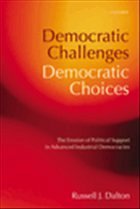Most democratic citizens today are now questioning the very pillars of representative democracy. 'Democratic Challenges, Democratic Choices' uses an array of cross-national public opinion surveys to document the corrosion of political support in virtually all Western democracies.
Most democratic citizens today are distrustful of politicians, political parties, and political institutions. Where once democracies expected an allegiant public, citizens now question the very pillars of representative democracy. Democratic Challenges, D
1. The Challenge to Democracy; PART 1: THE EVIDENCE OF CHANGE; 2. Changing Citizen Orientations; Epilogue: American Reactions to September 11, 2001; PART 2: THE SOURCES OF CHANGE; 3. The Correlates of Political Support; 4. Social Change and the Cumulation of Incremental Effects; 5. Value Change and Political Support; 6. Economic Performance and Political Support; 7. Policy Preferences and Political Support; PART 3: THE EFFECTS OF CHANGE; 8. The Consequences of Political Support; PART 4: CONCLUSION; 9. Citizens and Democracy: A New Relationship; References; Index
Most democratic citizens today are distrustful of politicians, political parties, and political institutions. Where once democracies expected an allegiant public, citizens now question the very pillars of representative democracy. Democratic Challenges, D
1. The Challenge to Democracy; PART 1: THE EVIDENCE OF CHANGE; 2. Changing Citizen Orientations; Epilogue: American Reactions to September 11, 2001; PART 2: THE SOURCES OF CHANGE; 3. The Correlates of Political Support; 4. Social Change and the Cumulation of Incremental Effects; 5. Value Change and Political Support; 6. Economic Performance and Political Support; 7. Policy Preferences and Political Support; PART 3: THE EFFECTS OF CHANGE; 8. The Consequences of Political Support; PART 4: CONCLUSION; 9. Citizens and Democracy: A New Relationship; References; Index
Review from previous edition For several decades, social scientists have been concerned by evidence of declining trust in government and declining social capital. The implications have been hotly debated, with the most influential school seeing these trends as threatening the survival of democracy. In Democratic Challenges, Democratic Choices, Dalton analyzes a broader body of evidence than has ever before been examined, probing deeply. His balanced new assessment is likely to emerge as the definitive interpretation of these trends. Ronald Inglehart, Professor of Political Science at the University of Michigan, and Director of the World Values Surveys

